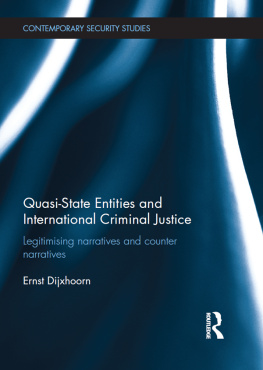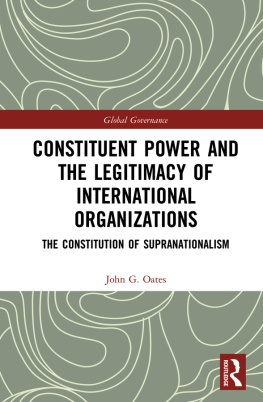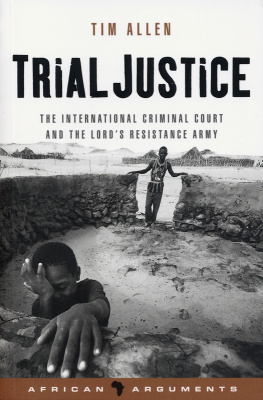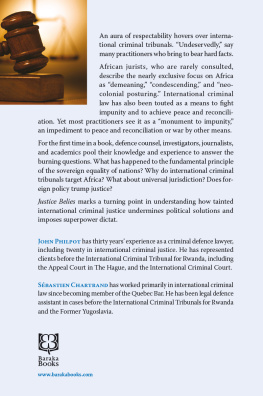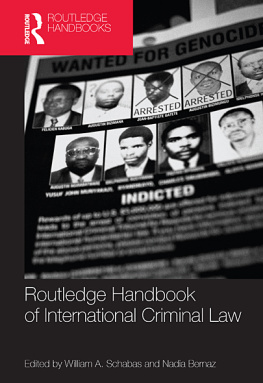
Quasi-State Entities and International
Criminal Justice
This book explores the intended and unintended impact of international criminal justice on the legitimacy of quasi-state entities (QSEs).
In order to do so, the concept of quasi-state entity is introduced to distinguish actors in statehood conflicts that aspire to statehood, and fulfil statehood functions to a greater or lesser degree, including the capacity and willingness to deploy armed force, but lack the status of sovereign statehood. This work explores the ability of QSEs to create and maintain legitimacy for their actions, institutions and statehood projects in various constituencies simultaneously. It looks at how legitimacy is a prerequisite for success of QSEs and, using critical legitimacy theory, assesses the legitimating narratives of QSEs and their statehood adversaries. The book links international criminal justice to statehood projects of QSEs and their success and legitimacy. It looks at the effects of international criminal justice on the ability to create and maintain legitimacy of QSEs, an approach that leads to new insights regarding international courts and tribunals as entities competing with states over statehood functions that increasingly have to take the legal implications of their actions into consideration. Most important, a close assessment of the legitimising narratives of QSEs, counter narratives, and the messages sent by international criminal justice with which QSEs have to deal, and their ability to overcome legitimacy crises, provides insight on QSEs and the complex processes of legitimation.
This book will be of much interest to students of international criminal justice, political violence, security studies and IR.
Ernst Dijxhoorn is Teaching and Research Fellow at the Department of War Studies at Kings College London. He is co-editor of Militancy and Violence in West Africa (with James Gow and Funmi Olonisakin, Routledge 2013).
Contemporary Security Studies
Series Editors: James Gow
and
Rachel Kerr
Kings College London
This series focuses on new research across the spectrum of international peace and security, in an era where each year throws up multiple examples of conflicts that present new security challenges in the world around them.
Mechanistic Realism and US Foreign Policy
A new framework for analysis
Johannes Gullestad R
Prosecuting War Crimes
Lessons and legacies of the International Criminal Tribunal for the former Yugoslavia
Edited by James Gow, Rachel Kerr and Zoran Paji
The NATO Intervention in Libya
Lessons learned from the campaign
Edited by Kjell Engelbrekt, Marcus Mohlin and Charlotte Wagnsson
Truth Recovery and Transitional Justice
Deferring human rights issues
Iosif Kovras
Reconstructing Afghanistan
Civil-military experiences in comparative perspective
Edited by William Maley and Susanne Schmeidl
Strategic Narratives, Public Opinion and War
Winning domestic support for the Afghan War
Edited by Beatrice De Graaf, George Dimitriu and Jens Ringsmose
Liberal Wars
Anglo-American strategy, ideology, and practice
Edited by Alan Cromartie
Prosecuting Slobodan Miloevi
The unfinished trial
Nevenka Tromp
Media Strategy and Military Operations in the 21st Century
Mediatizing the Israel Defence Force
Michal Shavit
Ethics, Law and Justifying Targeted Killings
The Obama administration at war
Jack McDonald
Quasi-State Entities and International Criminal Justice
Legitimising narratives and counter narratives
Ernst Dijxhoorn
Quasi-State Entities and
International Criminal Justice
Legitimising narratives and counter
narratives
Ernst Dijxhoorn

First published 2017
by Routledge
2 Park Square, Milton Park, Abingdon, Oxon OX14 4RN
and by Routledge
711 Third Avenue, New York, NY 10017
Routledge is an imprint of the Taylor & Francis Group, an informa business
2017 Ernst Dijxhoorn
The right of Ernst Dijxhoorn to be identified as author of this work has been asserted by him/her in accordance with sections 77 and 78 of the Copyright, Designs and Patents Act 1988.
All rights reserved. No part of this book may be reprinted or reproduced or utilised in any form or by any electronic, mechanical, or other means, now known or hereafter invented, including photocopying and recording, or in any information storage or retrieval system, without permission in writing from the publishers.
Trademark notice: Product or corporate names may be trademarks or registered trademarks, and are used only for identification and explanation without intent to infringe.
British Library Cataloguing-in-Publication Data
A catalogue record for this book is available from the British Library
Library of Congress Cataloging-in-Publication Data
Names: Dijxhoorn, Ernst, author.
Title: Quasi-state entities and international criminal justice : legitimising
narratives and counter-narratives / Ernst Dijxhoorn.
Description: Abingdon, Oxon ; New York, NY : Routledge, 2017. | Series:
Contemporary security studies | Based on authors thesis (doctoral
Kings College London, 2014) issued under title: International criminal
justice, quasi-state entities and legitimacy | Includes bibliographical
references and index.
Identifiers: LCCN 2016039301 | ISBN 9781138224292 (hardback : alk.
paper) | ISBN 9781315402864 (ebook)
Subjects: LCSH: Non-state actors (International relations) | International
criminal law.
Classification: LCC KZ6405.N66 D55 2017 | DDC 341.6/9dc23
LC record available at https://lccn.loc.gov/2016039301
ISBN: 978-1-138-22429-2 (hbk)
ISBN: 978-1-315-40286-4 (ebk)
Typeset in Times New Roman
by Wearset Ltd, Boldon, Tyne and Wear
To Jo
Contents
During the research for this book, many encouraged, helped and advised me, however this book would never have been written without the enthusiastic support of my mentor and friend, James Gow. Both on a personal and academic level I am very much indebted to James for his help and advice. Many other people in the Department of War Studies at Kings College London also deserve my gratitude, especially Rachel Kerr, Funmi Olonisakin and Guglielmo Verdirame who gave me the chance to work on various research projects over the years. The Department gave me the opportunity to teach, and it is by teaching that students educate me more than they would suspect; I hope to pass on some of my enthusiasm for war studies and international law in return. Without my familys encouragement and advice I would not have been able to finish this book. I am filled with gratitude for the unremitting support my parents, Marie-Thrse and Edward, gave, and continue to give, me. I would like to thank my sister Floor, not in the least for always welcoming me with open arms, together with Onno, whenever I am back in Amsterdam. Over the last few years Aernout made me feel at home in The Hague and greatly encouraged my academic endeavours. I would like to thank Hannah Ferguson and Andrew Humphrys at Routledge for their support and patience. Last, but certainly not least, I am extremely fortunate to have Jo in my life, and very thankful for her unrelenting support, encouragement and advice.
Next page
